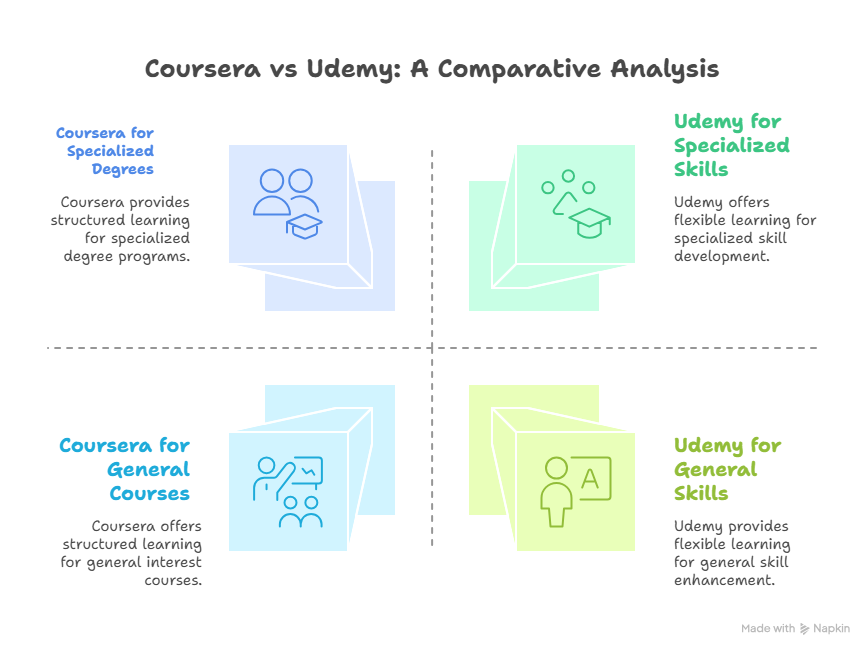The online learning landscape is booming, with over 130 million people worldwide turning to digital platforms for skill development and education.
With numerous options available, choosing the right online course platform can be daunting. Two prominent players in this space are leading the way, offering a vast array of courses.
When it comes to online learning, the debate between these platforms centers around course quality, pricing, and user experience. Understanding the differences between them is crucial for making an informed decision.
This comparison aims to guide you through the key differences, helping you choose the platform that best suits your learning needs.
Understanding the E-Learning Giants
The e-learning landscape is led by Coursera and Udemy, two platforms that cater to different learning needs and preferences. Understanding their underlying philosophies and structures is crucial for making an informed decision about which platform is right for you.
Coursera’s Academic Approach
Coursera partners with top universities worldwide to offer courses that are often rooted in academic rigor. This approach ensures that learners are exposed to high-quality educational content, with many courses mirroring university curricula. Coursera’s focus on structured learning paths appeals to those seeking a more traditional academic experience online.
Udemy’s Marketplace Model
Udemy, on the other hand, operates as an open marketplace where instructors can create and sell courses on a wide range of topics. This model fosters a diverse catalog of courses, including niche subjects that might not be found on more academically oriented platforms. The variety and flexibility of Udemy’s offerings make it a popular choice for learners looking for specific skills or knowledge.
Platform Philosophies Compared
While Coursera emphasizes academic credibility and structured learning, Udemy focuses on diversity and accessibility. This fundamental difference in philosophy impacts the learning experience on each platform. For learners prioritizing academic rigor, Coursera might be the better choice. For those seeking a broad range of topics and flexibility, Udemy could be more suitable. The choice between these best online learning sites ultimately depends on your individual learning goals and preferences.
Coursera vs Udemy: A Comprehensive Comparison
Let’s break down the differences between Coursera and Udemy to make an informed decision. Both platforms have gained popularity for their extensive course offerings, but they cater to different learning needs and preferences.

Course Quality and Instructor Credentials
Coursera is known for its academic rigor, partnering with top universities worldwide to offer courses that are often taught by faculty members. This ensures a high level of course quality and instructor expertise. In contrast, Udemy operates as a marketplace, allowing experts and professionals to create courses. While this leads to a diverse range of courses, the quality can vary significantly depending on the instructor’s background.
Pricing Structures and Value for Money
Coursera offers a subscription-based model through Coursera Plus, providing access to a vast majority of its courses for a flat annual fee. Udemy, on the other hand, prices courses individually, with frequent discounts and promotions. The value for money depends on the learner’s goals: those seeking a broad learning experience might prefer Coursera’s subscription, while those with specific course needs might find Udemy’s à la carte pricing more appealing.
Certificates and Career Impact
Coursera’s courses often result in universally recognized certificates, which can be a significant advantage for career advancement. These certificates are issued by the partner universities, lending credibility to the learner’s skills. Udemy also offers certificates upon course completion, but their recognition can vary by employer.
Course Selection and Specialization Options
Coursera excels in offering specialization programs that are designed to develop deep expertise in a specific area. These programs are typically created by leading universities. Udemy, while having a vast course catalog, doesn’t offer the same level of structured specialization. However, its courses cover a broad range of topics, making it a good platform for exploratory learning.
Learning Experience and Interface
Both platforms offer user-friendly interfaces, but they differ in their approaches. Coursera’s platform is designed to support a more traditional academic experience, with a focus on video lectures, readings, and peer-graded assignments. Udemy’s platform is more flexible, allowing instructors to create a variety of content types, including interactive elements and downloadable resources.
Conclusion: Making Your Final Decision
Choosing between Coursera and Udemy depends on your individual learning goals and priorities. Coursera’s academic approach offers high-quality courses from top universities, while Udemy’s marketplace model provides a wide range of courses at affordable prices.
When comparing coursera vs udemy pricing, consider the value you receive. Coursera’s courses may be more expensive, but they often come with recognized certificates and academic credibility. Udemy, on the other hand, offers frequent discounts and a more flexible pricing structure.
In the online education comparison between Coursera and Udemy, it’s clear that both platforms have their strengths. Coursera excels in providing structured, academically rigorous courses, while Udemy offers a diverse range of topics and skill-based learning.
Ultimately, your decision should be based on what matters most to you. If you prioritize academic rigor and recognized credentials, Coursera might be the better choice. If you’re looking for a more affordable, flexible option with a wide range of courses, Udemy could be the way to go.
FAQ
What are the main differences between Coursera and Udemy?
Coursera partners with top universities to offer structured learning paths, while Udemy operates as an open marketplace for instructors, offering a diverse range of courses.
Which platform is more suitable for career advancement?
Coursera is often preferred for career advancement due to its university-backed courses and recognized certificates, which can be beneficial for professional growth.
How do the pricing structures of Coursera and Udemy compare?
Udemy is known for frequent discounts and promotions, making it potentially more affordable. Coursera offers financial aid and subscription models, which can also be cost-effective.
Can I get a certificate from both platforms?
Yes, both Coursera and Udemy offer certificates upon course completion. However, Coursera’s certificates are often more prestigious due to their academic affiliations.
What kind of courses can I expect on each platform?
Coursera focuses on academic and professional courses, often with a structured curriculum. Udemy offers a wide range of courses, including niche and hobby-based subjects.
Are the courses on Coursera and Udemy self-paced?
Yes, both platforms offer self-paced courses, allowing learners to study at their own convenience. However, Coursera also offers guided learning paths with set schedules.
How do I choose between Coursera and Udemy for my learning needs?
Consider your learning goals, budget, and preferred learning style. If you prioritize academic rigor and recognized credentials, Coursera might be the better choice. For a diverse range of courses and potentially lower costs, Udemy could be more suitable.

